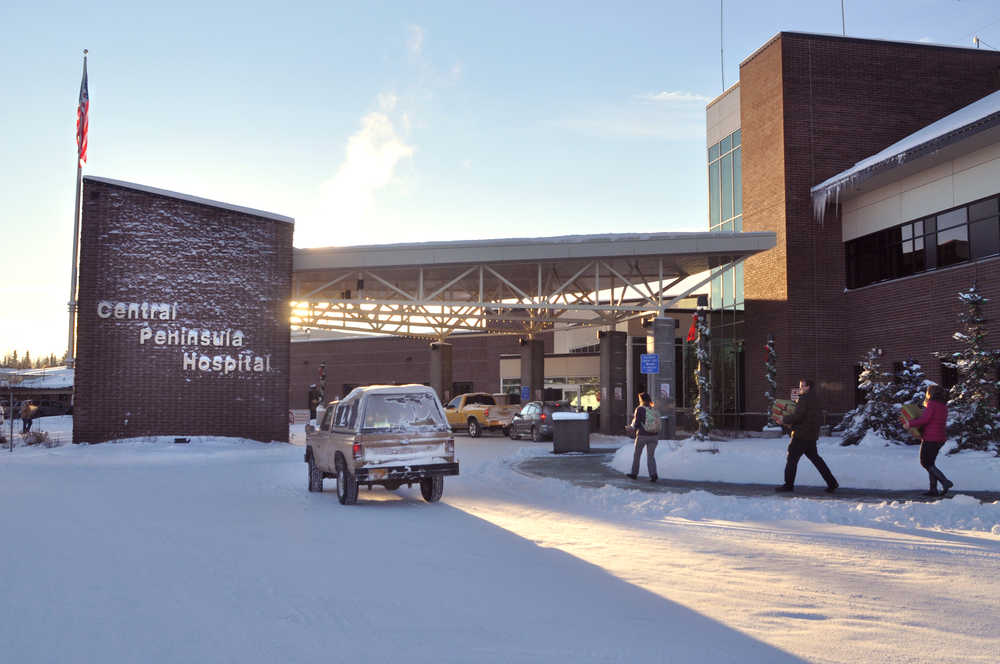A specialty clinic space at Central Peninsula Hospital will soon be outfitted with more than $3.2 million in equipment, including some that the state previously prohibited the hospital from buying.
The Kenai Peninsula Borough will hold a public hearing during its June 16 meeting to discuss appropriating the money for the hospital’s newest building, which is scheduled to open by mid-January 2016.
Included in that appropriation are about $865,000 in funds to build and equip a set of endoscopy procedure rooms. Endoscopy is a non-surgical procedure that is used to examine a person’s digestive tract.
The decision to allow both endoscopy clinics to be installed in the building is a reversal of one the state’s Department of Health and Human Services, DHSS, made in November 2013. The state also reconsidered a decision to deny the hospital’s application to install a CT scanner in the new building. CT scans, or CAT scans, are a type of X-ray test that generates a cross-section image of the body.
CPH included both of those services in its plans for the clinic in its 2013 application for a Certificate of Need from DHSS.
The state denied the addition of two endoscopy suites in part because the hospital’s application included anesthesia machines in the suites — equipment that the state determined was not needed to perform a procedure with an endoscope, but would be necessary to perform surgery.
DHSS received public comment warning that approval of those two suites would result in later conversion of those spaces into surgical suites without the need for state approval, said Jared Kosin, the state’s Executive Director of the Office of Rate Review, which handles the Certificate of Need process.
The state eventually issued a Certificate of Need to the hospital on the condition that if it ever chose to include endoscopy services or surgical suites in its specialty clinics building it would first approach DHSS for permission.
Hospital administration filed a Request for Determination in 2014, a requirement of its original Certificate of Need approval, asking the state to approve endoscopy suites to help ease congestion in the hospital’s current facility.
Further, the request includes an explanation of the circumstances around the denial that explains why the hospital did not demonstrate a need for the new endoscopy spaces — a requirement that hospital administrations said was not included in the original application and didn’t become clear until after the state had rejected the spaces.
“We never thought that denial was accurate,” said Central Peninsula Hospital External Affairs Manager Bruce Richards.
In asking for the spaces again, hospital administrators wrote that the current endoscopy procedures are done in the operating room, OR, area of the hospital and cause congestion.
Richards said if two people went into the OR area of the hospital, one needing surgery and the other a colonoscopy, the surgical patient would take up a pre-operating room for a short period of time and then be moved to another section of the hospital for recovery. The colonoscopy patient would take up the room the whole time.
“It has really created a log jam over there and it was our plan to get that log jam out of there,” Richards said.
The state approved the hospital’s request to outfit the new specialty clinics building primarily because the circumstances that would allow the hospital to expand those rooms into surgical suites, have changed, according to a Jan. 9, 2015 letter to the hospital from DHSS.
“They demonstrated a genuine need for more procedure space and on top of that, we know they’ll have to come back if they want to convert it into surgery suite space. So we felt it was reasonable to reconsider the request,” Kosin said.
Funds for an additional CT scanner were not included in the hospital’s most recent funding request to the borough but will likely be included in its last request to outfit the new building.
Reach Rashah McChesney at rashah.mcchesney@peninsulaclarion.com or follow her on Twitter @litmuslens.

